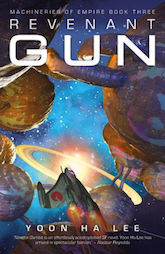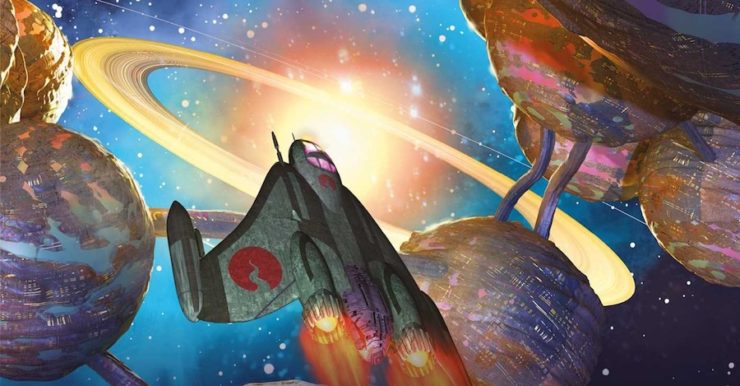If you’ve paid any attention to the SFF Awards scene in recent years, you’ll recognize Yoon Ha Lee and his Machineries of Empire trilogy. Each of the first two volumes, Ninefox Gambit and Raven Stratagem, picked up Hugo Award nominations for Best Novel, and Ninefox Gambit also landed on the Nebula ballot. Lee has long been respected for his short fiction, but his early career as a novelist has been even more dramatic and impressive. The first two volumes in the series blend impressively complex SFnal ideas with strong characterizations, an endless supply of imagination, seriously satisfying combat, and a labyrinthine military-political plot that develops at just the right speed.
It’s no surprise, then, that the final volume in the series, Revenant Gun, is another winner. What started in Ninefox Gambit reaches its stunning conclusion in one of 2018’s best science fiction novels, and cements Lee alongside Leckie as one of science fiction’s foremost authors.
Buy the Book


Revenant Gun (Machineries of Empire)
Recently, Lee wrote for The Book Smugglers, revealing that Ninefox Gambit was originally meant to be a standalone novel, but that as the story grew in the telling he eventually realized there opportunity to expand the series. In the original draft, “Jedao was an out-and-out sociopath, complete with brain-breakingly awful childhood flashback in which he vivisected one of the family’s pet geese,” Lee revealed. As I read this, I stopped for a moment, and realized how lucky we all are that Lee deviated from this initial draft and allowed the world and its characters to evolve into what we see today. Jedao as an “out-and-out sociopath” might have served well enough as a one-off antagonist, but instead, as we’ve discovered over three volumes, there’s a depth and level of complexity to his character that is nearly unmatched. Much of the trilogy, but especially Revenant Gun, deals with Jedao trying to come to grips with his reputation and to reconcile his feelings about the massacre that made him a monster in the eyes of the Hexarchate. Confined to a single novel, where he would have been defined by a singular character trait, would have oversimplified Jedao’s arc . Instead we’ve had the pleasure of spending three novels delving into Jedao not only as a brilliant tactician, but also as a conflicted, broken person. The way Lee juggles the varied and conflicted elements of Jedao’s personality is nothing short of masterful.
He does this in a rather unexpected way in Revenant Gun by (and I’m not going to consider this a spoiler, since it’s on the back of the book and revealed in the first chapter) introducing teenaged Jedao as a central character, thrust into the middle of military action as the Hexarchate continues to crumble in the fallout of of Cheris’ calendrical spike at the end of Raven Stratagem. For the most part, this Jedao, who lacks any memories past his high school years, is a blank slate—a generic teenager who prefers playing videogames to waging warfare. Because he lacks memories of his formative years as a military genius, this Jedao has to rely on instinct and gut feeling, which gives readers a deeper understanding of how Jedao became a notorious heretic with a secret soft spot. Things become more complicated when the older, grizzled Jedao appears—on the opposite side of the war from his younger counterpart.
Brezan, who was first introduced in Raven Stratagem, continues to be my favourite character. Where the series is full of characters who exemplify extreme behaviour or character traits—such as Cheris’ brilliant mathematics, Jedao’s unmatchable military prowess, or Kujen’s ruthless, sociopathic desire for power—Brezan is an ordinary guy who has been thrust into extraordinary circumstances. It’s a familiar trope, but because of the large-and-in-charge nature of the other characters, it’s a necessary ingredient for the series’ success, and one that makes Raven Stratagem and Revenant Gun much more effective and relatable than the oftentimes overwrought Ninefox Gambit.
In my review, I praised Raven Stratagem for resolving the complexity issue that dragged down Ninefox Gambit (and almost made me quit reading early on, which I’m grateful I did not do, considering my love for the trilogy overall), and Revenant Gun continues that trend. By this point, the world and universe are established, and even complex elements that added to the confusion in Ninefox Gambit—like calendrical rot, body swapping, and weapons like the void winnowers—feel natural and essential to the plot. As much as this is the result of me becoming familiar with the world, it’s also the result of Lee becoming better at doling out complex ideas only when they’re necessary, and tying them into the plot, rather than letting them build up like snow drifts in a storm.
Revenant Gun has everything I wanted from a conclusion to the Machineries of Empire trilogy. It’s chock-full of characters that are broken, intensely interesting, vicious, and yet somehow still empathetic and likeable. It’s about the, well… machineries of empires, as they chew people and cultures up, leaving behind a trail of death and broken societies behind in the selfish quest to grow so large they crumble under their own weight. It’s about personal sacrifice and growth. It’s about the emotional toll of combat and war. If you’d told me when I first picked up Ninefox Gambit, and almost put it down just as quickly, that by the end of the trilogy I’d have grown to love Jedao and Cheris, and to care deeply about their blood-soaked, calendar-obsessed universe, I’d have laughed—but here we are. Lee’s Machineries of Empire is one of the finest science fiction achievements of the decade, and deserving of every accolade thrown at it. Machineries of Empire has a reputation for being brain-breaking and imaginative, which it is, but, by its conclusion, it’s also approachable and amusing, warm-hearted, even as it’s sinking its claws into your back, funny, furious, and endlessly creative. Revenant Gun, like the volumes before it, comes with my highest recommendation.
Revenant Gun is available from Solaris.
Aidan Moher is the Hugo Award-winning founder of A Dribble of Ink, author of “On the Phone with Goblins” and “The Penelope Qingdom”, and a regular contributor to Tor.com and the Barnes & Noble SF&F Blog. Aidan lives on Vancouver Island with his wife and daughter, but you can most easily find him on Twitter @adribbleofink and Patreon.











As much as I wanted to read Ninefox, I also put it down, deciding to return to it once the series was complete. Should I fast-forward thru volume 1, or even skip to volume 2?
@1 I had trouble getting into Ninefox Gambit as well and skimmed the first 50 pages or so; after that point it gets much easier. I wouldn’t recommend skipping it since Raven Stratagem won’t make as much sense without knowing the events leading up to it.
I am something of a calendrical heretic when it comes to this series. I totally dug Ninefox Gambit, and thought Raven Stratagem was great, but not quite as breathtaking as Ninefox. If you are reading Ninefox Gambit for the first time, and want to put it down, don’t. Instead, take notes. It really helped me to note down each of the factions, the area of governance/civilization they are associated with, and which of characters belongs to that faction. Or nowadays one can google them: http://www.yoonhalee.com/?p=836